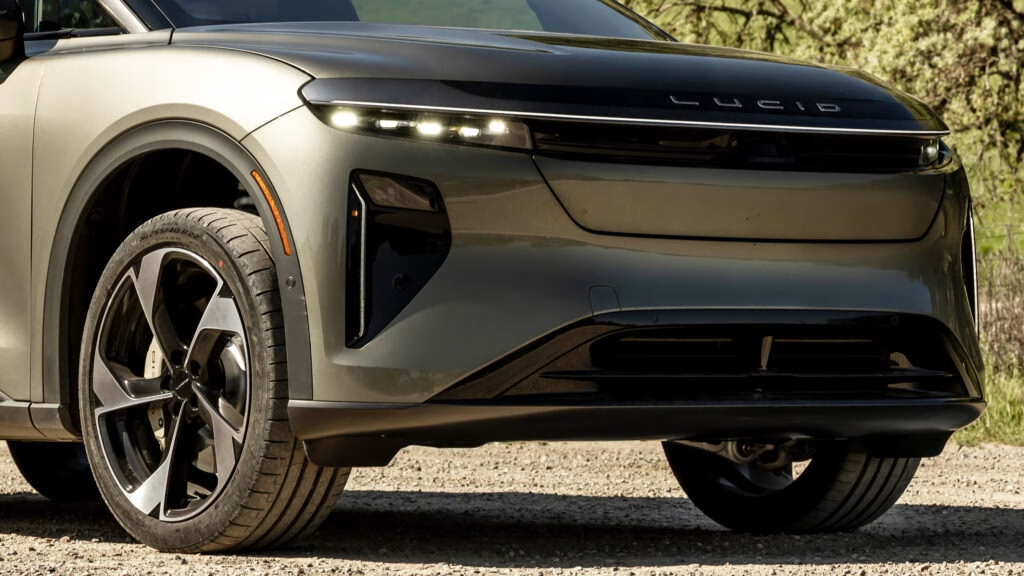How does the end of the federal EV tax credit affect Lucid Gravity buyers?
If you’ve been eyeing the Lucid Gravity, the landscape is shifting fast. The federal $7,500 EV tax credit, which has helped make electric vehicles more affordable for years, is set to vanish at the end of September. This change, driven by new federal policy, means that buyers and lessees of luxury EVs like the Gravity will soon lose out on a significant financial incentive. For a vehicle with a starting price just under $95,000, that’s no small chunk of change.
Lucid, however, isn’t letting this policy shift leave its customers stranded. The company has stepped up with its own $7,500 Lucid Advantage Credit for anyone who leases a new Gravity between October 1 and December 31. This move isn’t just about generosity—it’s a strategic play to keep the Gravity competitive in a market where price can make or break a deal. For current Lucid customers looking to upgrade, the same benefit applies, which is a rare bit of good news in an otherwise turbulent EV market.
Is now the best time to lease a Lucid Gravity?
Timing is everything, especially when it comes to big-ticket purchases like electric SUVs. With the federal credit ending and Lucid’s own $7,500 lease incentive filling the gap for a limited time, there’s a real window of opportunity here. If you finalize a lease before the end of December, you’re essentially getting the same deal you would have with the federal tax break.
But there’s another layer: Lucid is only offering the Gravity in its Grand Touring trim right now, starting at $94,900. Next year, a more affordable Touring version will hit the market at $79,900. If you’re set on the Grand Touring, acting before the end of the year locks in that $7,500 savings. If you’re willing to wait for the Touring, you’ll pay less up front, but the Lucid Advantage Credit may no longer be available. It’s a classic “bird in the hand” scenario.
What’s behind Lucid’s decision to offer its own $7,500 credit?
Let’s be real: Lucid is in a tough spot. The company has poured years and serious capital into developing the Gravity, and it’s still not profitable. Losing the federal incentive could have slammed the brakes on sales momentum just as production is ramping up. By funding its own $7,500 credit, Lucid is taking a financial hit—essentially absorbing the cost to keep the Gravity attractive to buyers.
Erwin Raphael, Lucid’s vice president of revenue, has openly acknowledged how crucial the federal tax credit has been in nudging drivers toward EVs. The company’s willingness to step in with its own incentive underscores just how high the stakes are. For Lucid, this isn’t just about selling cars—it’s about survival and long-term growth in a fiercely competitive market.
How is Lucid handling production and supply challenges?
Building a new luxury SUV from the ground up is never simple, and Lucid’s journey with the Gravity has had its share of speed bumps. Production kicked off in late 2024, but supplier constraints—especially shortages of head-up displays and power outlets—have slowed the rollout. Recent drone footage from Lucid’s Arizona factory shows hundreds of Gravity SUVs parked and waiting, a visual reminder of the logistical hurdles even well-funded startups face.
Despite these challenges, Lucid’s engineering remains a bright spot. The Gravity’s 926-volt electrical architecture allows for ultra-fast charging—think 200 miles of range in under 12 minutes at a 400 kW charger. It’s the kind of tech that can sway buyers who might otherwise hesitate at the thought of long charging stops. And with the Touring model set to launch soon at a lower price point, Lucid is clearly betting on broader appeal.
How does the Lucid Gravity stack up against other luxury EVs?
The luxury EV market is crowded, but the Gravity brings some unique strengths to the table. Its fast-charging capability, spacious interior, and high-end features put it in direct competition with established players like the Tesla Model X and Mercedes EQS SUV. But Lucid’s willingness to offer a $7,500 lease credit, even as federal incentives disappear, gives it a short-term edge that’s hard to ignore.
Industry analysts point out that incentives can make or break a new model’s launch. According to a 2023 report from the International Energy Agency, financial incentives remain one of the top factors influencing EV adoption, especially in the luxury segment. Lucid’s move isn’t just smart—it’s necessary to keep pace with rivals who have deeper pockets and more established dealer networks.
What should potential buyers consider before making a move?
If you’re thinking about leasing a Lucid Gravity, weigh your options carefully. The $7,500 Lucid Advantage Credit is a genuine, time-limited offer that won’t be around forever. If you want the Grand Touring model and can move quickly, you’ll maximize your savings. If you prefer to wait for the lower-priced Touring version, be prepared that the extra incentive may be gone by then.
Also, consider the broader EV market dynamics. Supply chain hiccups can affect delivery timelines, and the end of federal incentives could shift pricing strategies across the board. Keep an eye on updates from Lucid and other automakers—flexibility is your friend in a fast-changing market.
The big takeaway? Scoring a deal on a Lucid Gravity isn’t about perfection—it’s about smarter adjustments. Start with one change this week, and you’ll likely spot the difference by month’s end.

